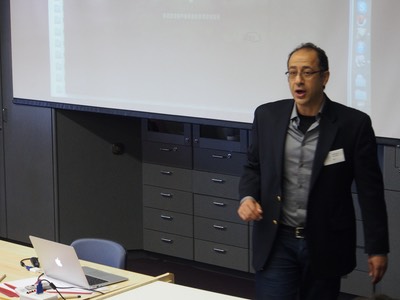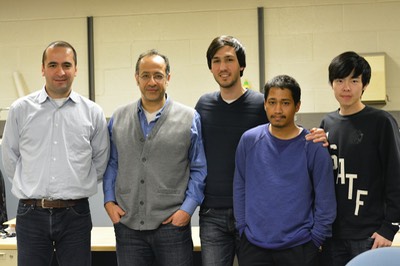ECSE-4660/6660 Internetworking of Things
Note for Spring 2021: Given Covid19 distancing rules, this course is listed as Hybrid. Students who are remote are able to register for this course. All class material will be available online. The % grades for homeworks, labs, and project will be adjusted. Remote students will be able to conduct the lab remotely. More information will follow in the next few weeks.
Tentative syllabus: Spring 2021
Example syllabus: Spring 2019.
This course, first offered in Spring 2017, provides an in-depth study of the technologies and protocols involved in building the Internet-of-Things (IoT), with specific focus on networking at the edge of the Internet. This includes understanding of wireless communication and link layer technologies, multi-access and scheduling mechanisms, mobility models, routing in disconnected networks, energy-efficient edge networking, loss tolerant transport protocols, and their applications to emerging areas such as vehicular networks, RFID systems and smart buildings. The course also discusses IoT Security and data/content distribution, aggregation, and compression. The course has a strong emphasis on hands-on experience utilizing Raspberry Pi’s, Arduino’s, and NI software radio boards, and a significant part of the course assessment is based on a final project focused on building a wireless based application such as indoor localization for IoT devices.
ECSE 6510 - Introduction to Stochastic Signals and Systems
Deterministic signal representations and analysis, introduction to random processes and spectral analysis, correlation function and power spectral density of stationary processes, noise mechanisms, the Gaussian and Poisson processes.
Markov processes, the analysis of linear and nonlinear systems with random inputs, stochastic signal representations, orthogonal expansions, the Karhunen-Loeve series, channel characterization, introduction to signal detection, linear mean-square filtering, the orthogonality principle, optimum Wiener and Kalman filtering, modulation theory, and systems analysis.
ECSE-6962 - Mobile Wireless Networks
An advanced networking graduate-level course designed for students with computer networks background. The goal is to provide students with a broad perspective on the active research areas in wireless networks, and in the process leads them toward exploring their research experiences. It focuses on developing quantitative understanding of wireless networks. Topics to be covered include: Medium access in cellular, ad-hoc and future hybrid networks; Routing, flow control and transport in wireless multi-hop networks; Wireless networks performance evaluation and cross-layer design; Cognitive radio and dynamic spectrum access networks.
ECSE 6820 - Queuing Systems and Applications
A course on fundamentals of stochastic processes and queuing theory emphasizing applications. Poisson processes, renewal processes, Markov chains, general methods in the study of Markovian and non-Markovian systems, tandem queues, networks of queues, priority and bulk queues, computational methods, and simulation. Focus of the course is the application of these tools in the performance evaluation and design of computer systems, communication networks, manufacturing systems, and service systems.
ECSE-4500/2500 - Probability for Engineering Applications
Axioms of probability, joint and conditional probability, random variables, probability density, mass, and distribution functions, functions of one and two random variables, characteristic functions, sequences of independent random variables, central limit theorem, and laws of large numbers. Applications to electrical and computer engineering problems.
ECSE 4670 - Computer Communication Networks
Introduction to the basic concepts of computer and communication networks, like flow control, congestion control, end-to-end reliability, routing, framing, error-recovery, multiple access and statistical multiplexing. In-depth presentation of the different networking layers, with emphasis on the Internet reference model. Protocols and architectures such as TCP, IP, Ethernet, wireless networks, etc. are described in order to illustrate important networking concepts. Introduction to quantitiative analysis and modeling of networks.
ECSE-2660 - Computer Architecture, Networking and Operating Systems
Quantitative basis of modern computer architecture, processor design, memory hierarchy, and input/output methods. Layered operating system structures, process and storage management. Layered network organization, network protocols, switching, local and wide area networks. Examples from Unix and the Internet.
ENGR-2600 - Modeling and Analysis of Uncertainty
Appreciation and understanding of uncertainties and the conditions under which they occur, within the context of the engineering problem-solving pedagogy of measurements, models, validation, and analysis. Axiomatic probability, random events, random variables, conditioning, distributions, and central limit theorem. Descriptive and inferential statistics, confidence intervals, hypothesis testing, regression, and distribution-free procedures. Concepts will be supported with computer demonstration. Applications to problems in engineering are emphasized.
ECSE-2010: Electric Circuits
Techniques for the analysis and simulation of linear electric circuits, and measurements of their properties. Topics include resistive and energy-storage elements, controlled sources and operational amplifiers, systematic analysis methods, AC steady state, power and three-phase systems, magnetic coupling and transformers, transients, s-plane representation and analysis, frequency response, and Laplace transform and computer-aided methods.

